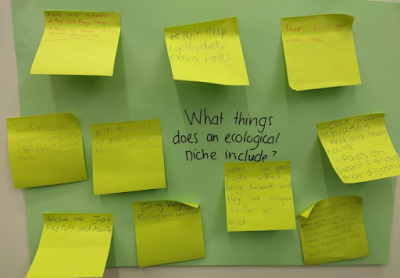9TGn is getting increasingly used to reading together in pairs and small groups, as well as discussing what they've read. I designed a litearcy activity to more deeply explore what an "ecological niche" is, in the context of Weta - New Zealand's Mouse.
My recent readings have reiterated that it's not good enough to just give a scientific text to a class and expect them to engage with it, learn from it, acquire language or comprehend it in a way that's beneficial.
I created a guided reading (with only three prompts and three discussion points this time - I've done some with more and they REALLY got into that one) and students got on with the paired reading with very little fuss.
They helped each other with pronounciation of new words and some began to google the meaning of new words as they went. I thought this was interesting because I had created two versions of the guided reading; both had the same prompts, reading and discussion points but they had different glossary words down the side. They could have used the glossary for many of the words they Google'd but preferred to go to Google!
Also, a few students chose to do the reading online (the link was provided) but most of the others got out a pen and scribbled notes on their papers and used their finger or pen to read along with their peer.
Version 1 of the guided reading here
Version 2 here
Glossary words weren't limited to scientific vocabulary, it also included 'rancid,' 'distinguished,' 'fascinated' and 'deter.'
At the end of the guided reading and the discussions had taken place I gave out coloured post-its for students to share what they had talked about.
Students found the second discussion point the easiest; identifying whether a weta was male or female using evidence from a paragraph. The second-easiest point was the first, about 'what an ecological niche includes' - but that required students to take the specific evidence about a weta niche and generalise it out; an ecological niche doesn't include living in a cave, but it does include where something lives. The most difficult point was the 'summarising a paragraph' one. Some students struggled to combine information from sentences or identify the 'key point' or the 'gist' of the paragraph.
Unfortunately we ran out of time to do anything with shared post-its :( Perhaps I could have asked each small group to create a poster of the class' responses.






No comments:
Post a Comment